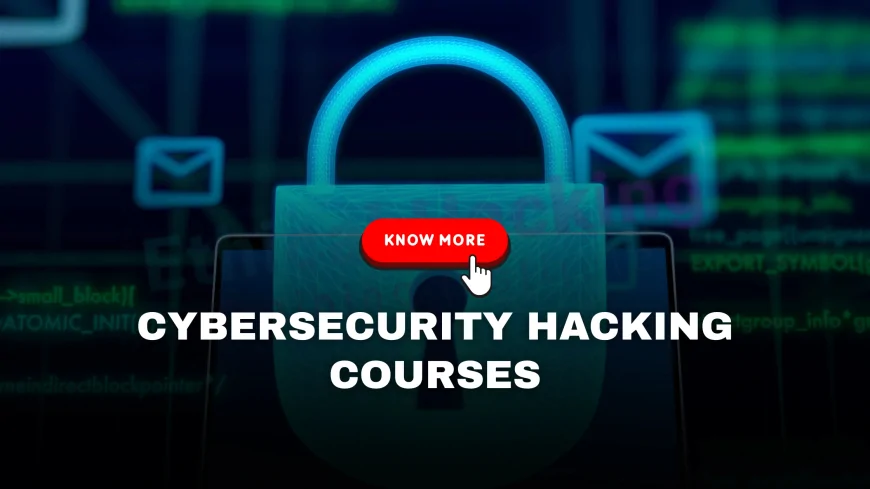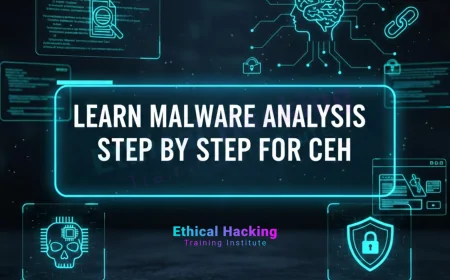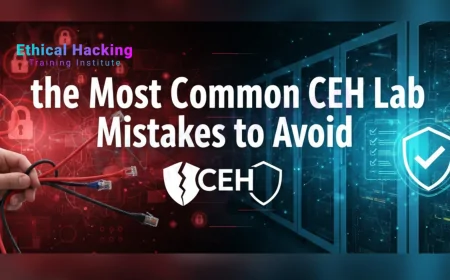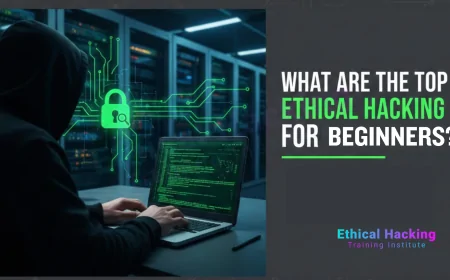Cyber Security Hacking Courses: Learn to Protect Systems and Spot Vulnerabilities | Hacking Courses for Beginners: Build Skills to Prevent and Detect Cyber Attacks
Explore the best cyber security hacking courses to learn ethical hacking, network defense, and vulnerability detection. Get certified and start your career in cybersecurity today.

Table of Contents
- Introduction
- Why Cybersecurity Matters
- Understanding Ethical Hacking
- Types of Cyber Security Hacking Courses
- Top Certifications in Cybersecurity
- Skills You Will Learn
- Who Should Enroll?
- Online vs Offline Courses
- Best Platforms to Learn Cybersecurity
- Importance of Real-World Projects
- Job Opportunities After Course
- Average Salary in Cybersecurity
- Tips for Success in Cybersecurity Learning
- Frequently Asked Questions (FAQs)
- Conclusion
Introduction
Cybersecurity hacking courses are at the forefront of tech education today. In a time where digital crimes are escalating, the need for skilled ethical hackers is more critical than ever. These courses teach individuals how to protect networks, systems, and data from malicious attacks using legitimate and lawful methods.
Why Cybersecurity Matters
In today’s connected world, digital systems power nearly every organization, big or small. Cyberattacks can lead to data loss, financial loss, and severe reputational damage. With increasing reliance on cloud storage, IoT, and web services, cybersecurity professionals have become digital guardians.
Understanding Ethical Hacking
Ethical hacking involves penetrating networks and systems (with permission) to discover vulnerabilities before malicious hackers do. It uses the same tools and techniques but for a constructive, protective purpose. Ethical hackers—also known as white hats—operate legally to secure digital infrastructure.
Key stages in ethical hacking:
-
Reconnaissance
-
Scanning & Enumeration
-
Gaining Access
-
Maintaining Access
-
Covering Tracks
-
Reporting and Recommendations
Types of Cyber Security Hacking Courses
-
Certified Ethical Hacker (CEH)
-
Offensive Security Certified Professional (OSCP)
-
CompTIA Security+
-
Certified Information Systems Security Professional (CISSP)
-
Penetration Testing Courses
-
Bug Bounty Training
-
Wi-Fi Hacking & Network Forensics
-
Python for Cybersecurity
-
Reverse Engineering and Malware Analysis
Each course provides a unique specialization and depth of learning.
Top Certifications in Cybersecurity
| Certification | Duration | Best For | Globally Recognized |
|---|---|---|---|
| CEH v12 | 4–6 months | Beginners to Intermediate | ✅ |
| OSCP | 3–6 months | Advanced Learners | ✅ |
| CompTIA+ | 3 months | Entry-Level IT Professionals | ✅ |
| CISSP | 6+ months | Senior Security Professionals | ✅ |
Certifications add credibility to your resume and are often required by employers.
Skills You Will Learn
-
Penetration testing
-
Social engineering
-
Network and Wi-Fi hacking
-
Vulnerability assessment
-
Secure coding practices
-
Equipping learners with skills in tools such as Nmap for scanning, Metasploit for exploitation, Burp Suite for web testing, and Wireshark for packet analysis.
-
Malware analysis
-
Linux command-line proficiency
Who Should Enroll?
-
College Students (IT/CS)
-
Software Developers
-
Network Engineers
-
IT Managers
-
Security Analysts
-
Anyone curious about ethical hacking
No prior hacking experience is necessary. Basic computer and networking knowledge is sufficient for most beginner-level courses.
Online vs Offline Courses
| Feature | Online | Offline |
|---|---|---|
| Flexibility | Self-paced or live | Fixed schedule |
| Accessibility | Anywhere with internet | Requires physical attendance |
| Networking | Limited to forums | Direct peer & mentor interaction |
| Cost | Often more affordable | Sometimes costlier |
Learn on your own terms by choosing a mode of study that works for you.
Best Platforms to Learn Cybersecurity
-
Cybrary – Courses on CEH, CompTIA, SOC Analyst
-
TryHackMe – Interactive labs for hands-on learning
-
Hack The Box (HTB) – Challenges for intermediate/advanced learners
-
Udemy – Budget-friendly courses for all levels
-
Coursera – University-level courses with certification
-
EC-Council – Official CEH certification
-
Offensive Security – OSCP and advanced training
Importance of Real-World Projects
Projects solidify theory into practice. Examples include:
-
Setting up a penetration test lab
-
Simulating phishing attacks in a test environment
-
Performing vulnerability scans
-
Writing security audit reports
Employers love to see hands-on experience, especially with tools and methodologies.
Job Opportunities After Course
-
Ethical Hacker
-
Penetration Tester
-
SOC Analyst
-
Cybersecurity Engineer
-
Security Consultant
-
Vulnerability Analyst
-
Red Team Member
Average Salary in Cybersecurity
| Role | Average Annual Salary (India) | Average Annual Salary (US) |
|---|---|---|
| Ethical Hacker | ₹6–12 LPA | $70,000–$120,000 |
| SOC Analyst | ₹4–8 LPA | $55,000–$90,000 |
| Pen Tester | ₹8–15 LPA | $80,000–$140,000 |
Source: Naukri, Glassdoor, Payscale (2024 data)
Tips for Success in Cybersecurity Learning
-
Practice on virtual labs (TryHackMe, HackTheBox)
-
Join ethical hacking communities
-
Build a personal portfolio on GitHub
-
Stay updated via threat intelligence blogs
-
Participate in CTF (Capture The Flag) events
-
Never stop learning — cybersecurity evolves fast!
Frequently Asked Questions (FAQs)
1. What is the best course to start learning ethical hacking?
The Certified Ethical Hacker (CEH) course is widely regarded as the best starting point for beginners. It covers the basics of ethical hacking and cybersecurity fundamentals.
2. Do I need a computer science degree to learn cybersecurity?
No, a degree is not mandatory. Many professionals enter the field with certifications and hands-on experience instead of formal degrees.
3. Is ethical hacking legal in India and worldwide?
Yes, ethical hacking is legal as long as it is performed with proper authorization and follows legal guidelines.
4. How long does it take to complete a cybersecurity hacking course?
Depending on the course, it can take anywhere from 3 to 6 months to complete and get certified.
5. What is the difference between white-hat, black-hat, and grey-hat hackers?
White-hat hackers are ethical hackers, black-hat hackers are malicious, and grey-hat hackers fall in between—working without authorization but not for harmful reasons.
6. Which certifications are best for getting a job in cybersecurity?
Popular certifications include CEH, OSCP, CompTIA Security+, and CISSP for different skill levels and job roles.
7. What tools do ethical hackers use?
Some of the common tools include Nmap, Metasploit, Wireshark, Burp Suite, John the Ripper, and Aircrack-ng.
8. Can I learn cybersecurity online for free?
Yes, platforms like TryHackMe, Cybrary, and freeCodeCamp offer free resources and beginner-friendly labs.
9. What are the career opportunities after completing a hacking course?
You can become an Ethical Hacker, SOC Analyst, Penetration Tester, Security Consultant, or Network Security Engineer.
10. Is programming required for ethical hacking?
Basic programming knowledge, especially in Python, Bash, or JavaScript, is helpful but not strictly required for beginners.
11. Are ethical hackers in demand?
Yes, due to the rise in cyberattacks, ethical hackers are in high demand globally across industries.
12. What is penetration testing?
Penetration testing (pen testing) is a simulated cyberattack to identify and fix security vulnerabilities in a system.
13. Can non-technical people learn hacking?
Yes, with dedication and the right guidance, even non-technical individuals can grasp cybersecurity fundamentals and grow in the field.
14. What is bug bounty hunting?
Bug bounty hunting involves finding security flaws in companies’ software and getting rewarded for responsibly reporting them.
15. Which is better: CEH or OSCP?
CEH is beginner-friendly and theory-based, while OSCP is hands-on and suited for advanced learners aiming for penetration testing roles.
16. How do I practice ethical hacking skills?
Use platforms like Hack The Box, TryHackMe, and set up virtual labs using tools like VirtualBox and Kali Linux for hands-on experience.
17. What industries hire ethical hackers?
Industries like IT, finance, government, healthcare, and e-commerce actively hire ethical hackers for security roles.
18. What is the salary of an ethical hacker in India?
Entry-level ethical hackers can earn ₹4 to ₹6 LPA, while experienced professionals can make ₹10–20 LPA or more.
19. What is the Red Team and Blue Team concept?
The Red Team simulates attacks, while the Blue Team defends against them. Both work together to improve an organization’s security posture.
20. Is cybersecurity a good career option in 2025?
Absolutely. With cyber threats growing rapidly, cybersecurity offers job stability, high salaries, and con
Conclusion
Cybersecurity hacking courses equip you with the skills to protect digital systems, uncover vulnerabilities, and prepare for high-paying jobs. Whether you're a beginner or an experienced IT professional, there’s a cybersecurity path for you. Start with foundational courses like CEH, move toward advanced certifications like OSCP, and practice consistently in virtual environments. In today’s data-driven world, ethical hackers are digital warriors—helping keep systems secure and societies safe.
What's Your Reaction?
 Like
0
Like
0
 Dislike
0
Dislike
0
 Love
0
Love
0
 Funny
0
Funny
0
 Angry
0
Angry
0
 Sad
0
Sad
0
 Wow
0
Wow
0


















